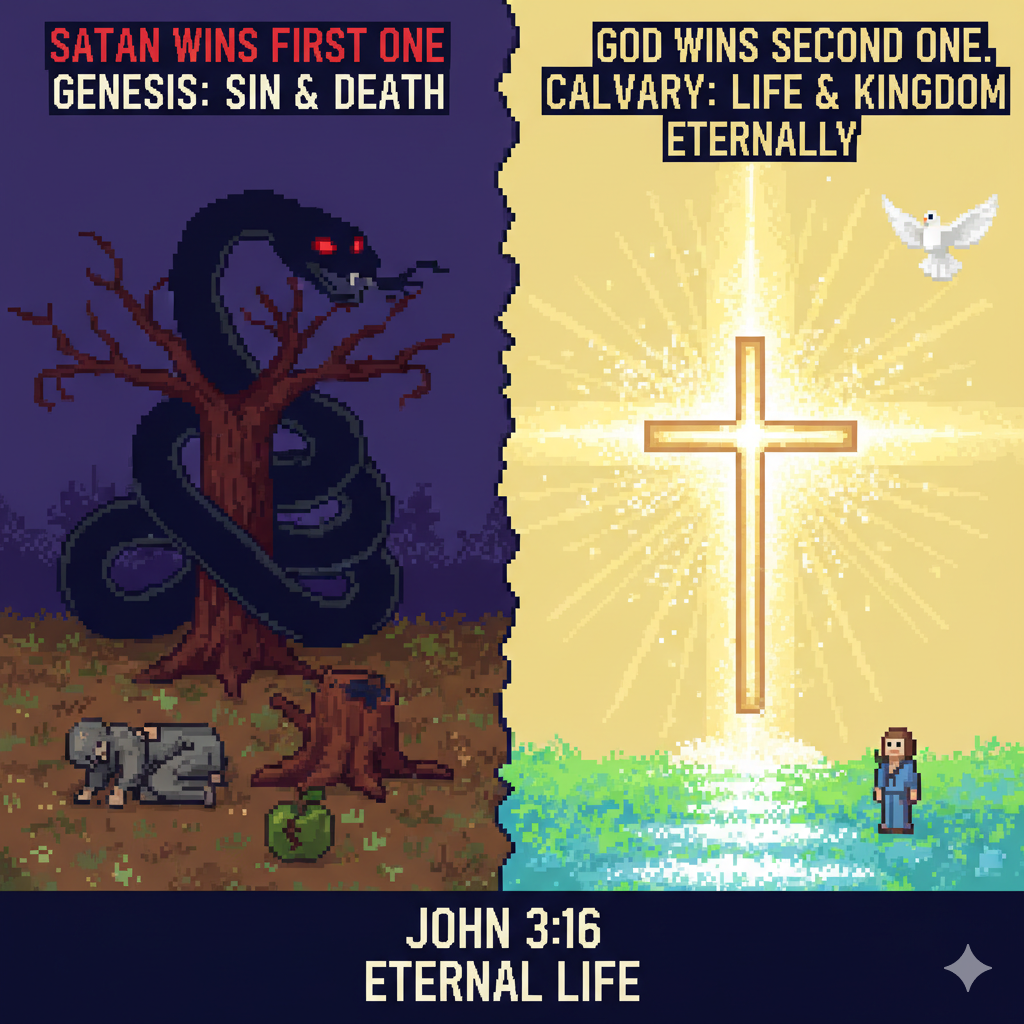The **first Creation story** begins in Genesis. Whether embraced as *ex nihilo* total creation of all reality, or a mix of metaphors, or as an oasis of a garden of God’s experiment with an evolved mankind that had existed hundreds of thousands of years without God’s intervention, what is more important is the ending of the sinless and perfect state within the garden by the actions of Satan. Sin, mortality, and misery are—in essence—created.
The **second Creation story** is of God’s Kingdom, which begins at the cross, when "God so loved the world, that he gave his only Son, that whoever believes in him should not perish but have eternal life" (John 3:16, ESV). At that precise moment, as the Son of God hung forsaken, abandoned by all—His friends, His apostles, and indeed, all of mankind—the Kingdom's foundation was laid. In that solitary hour of sacrifice, as darkness enveloped the earth and the Son cried out, "My God, my God, why have you forsaken me?" (Matthew 27:46, ESV), the Heavenly Father and His Son worked alone, orchestrating the greatest act of creation: salvation.
This Kingdom, the one we pray for in the words, "Your kingdom come, your will be done, on earth as it is in heaven" (Matthew 6:10, ESV), had its "zero hour" not in the dawn of creation, but in the depths of human sin and divine love.
The Serpent, also known as Satan, originally an anointed guardian cherub in Eden, sought to corrupt God's initial experiment with sin and mortality. Swelled with pride, he rebelled in the sense that he broke from serving God’s rule and introduced corruption into God’s garden experiment, shattering celestial harmony and becoming the first fallen Elohim. Cast from ever entering heaven again, his dominion became terrestrial, defined by chaos rather than God's nurturing order. His long game was to relentlessly sow disorder and inflict misery, twisting truth and fostering strife. He found fertile ground among the peoples of Canaan, where, as Melqart or Baal, he fostered the grotesque perversion of child sacrifice. This practice, where sons and daughters were passed through fire, became a defining feature of cultures under his sway.
God's counter-plan was revolutionary. He called Abraham, testing his fear of God to the limit by asking for his son, Isaac. But at the last moment, the Angel of the Lord intervened: "Do not lay a hand on the boy... Now I know that you fear God, because you have not withheld from me your son, your only son" (ESV). This was a definitive rejection of child sacrifice, establishing a people distinct from their Canaanite neighbors. God nurtured Israel, bringing them out of bondage in Egypt to be His instrument of judgment against the evil personified by Baal-Melqart, explicitly commanding them to eradicate child sacrifice. The Heavenly Father and Satan-Melqart were, in essence, in competition for dominion in our world. The Baal aspect of Satan asked his worshippers to sacrifice their children. The Heavenly Father did the exact opposite: God sacrificed His own Son to bless His worshippers.
John 3:16 (ESV)
“For God so loved the world, that he gave his only Son, that whoever believes in him should not perish but have eternal life.”
Then came the dawn of the third day. When Jesus the Messiah rose from the grave, a new creation burst forth, unprecedented in its scope. This was not merely a resuscitation; it was the first moment of eternal life entering our material existence, in our temporal universe. In His resurrection, Jesus was not merely a living being; He was the first eternal physical being in all of material reality. This was a foretaste and promise of the everlasting life offered to all who believe. His resurrected body, though physical, transcended the limitations of decay and death, signaling the inauguration of a Kingdom not of this world, yet powerfully present within it, continually acquiring those who believe in the life-giving truth of John 3:16.
Satan was defeated at the resurrection of Jesus. It was the truest and most spectacular victory in all of our material reality. This was the "second creation"—the creation of the Kingdom of God populated with redeemed people, people who, like their Savior, are no longer temporal but eternal.
This second creation, the creation of the God’s Kingdom, is more important than the creation in Genesis. It was the creation of eternal life. It undoes Satan’s effects on humanity by allowing humanity to gain salvation by believing in Jesus as the Son of God and as the sacrifice for our sins and mortality.

